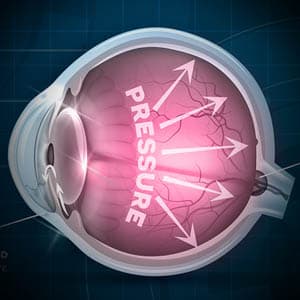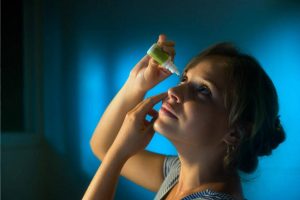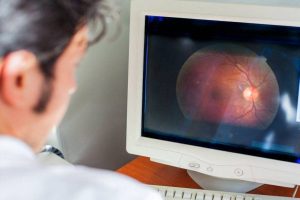The information on this page is not intended to be a substitute for professional medical advice.
Catch the ‘Silent Thief of Sight’ before it catches you
The most reliable way to prevent vision loss from glaucoma is by visiting your eye doctor for regular eye exams.
While preventing glaucoma altogether is not yet possible, early detection of the disease can help to preserve your vision, and reduce vision loss. Your eye doctor can identify signs of glaucoma, even in its early stages, and then recommend effective treatments to stop or even reduce its progression.
When to have an eye exam:
- Before age 40, every two to four years
- Between ages 40 to 54, every one to three years
- Between ages 55 to 64, every one to two years
- After age 65, every year
If you have a family history of glaucoma, or have a higher risk of developing the disease, schedule an eye exam every year, after age 35— or as directed by your doctor.
SEE RELATED: Smoking and Glaucoma
Exercise is key
Lace up your running shoes and get outside. Regular exercise will not only benefit your overall health, but studies have shown that moderate exercise at least three times per week, can actually reduce the pressure in your eyes (intraocular pressure, IOP).
As long as you are exercising, your eyes will feel the difference. This is why moderate exercise on a regular basis is recommended. Avoid intense exercise, as it can have the opposite effect, and contribute to increased eye pressure.
Yoga
While yoga can be beneficial for your ocular health, avoid placing your head below your heart, and stay away from inverted positions such as headstands, as these positions can double your eye pressure.
This is especially true if you have already been diagnosed with glaucoma, or you are at high risk of developing the disease.
Note: It is always important to speak with your doctor before starting any type of exercise program.
Protect your eyes
Protective eyewear can save your eyes from all sorts of dangerous accidents— from small particles or substances that may enter your eye, to larger objects that can penetrate your eye. An eye injury can cause traumatic glaucoma, or secondary glaucoma.
It is important to wear protective eyewear while playing sports, and participating in other activities, such as yard work or home improvement projects. Protecting your eyes will greatly help to reduce your risk of glaucoma.
Wear sunglasses to protect your eyes from the sun’s harmful ultraviolet (UV) rays. Overexposure to UV light over time, has been linked to the development of glaucoma, and other types of ocular diseases. Eye doctors recommend wearing polarized lenses, and a wide brimmed hat when venturing outdoors.
Avoid corticosteroids
Prolonged use of corticosteroids, commonly called steroids, may be prescribed for certain conditions such as severe allergies, arthritis, or other medical conditions. Prednisone, along with other oral steroids, can raise your eye pressure when used for more than two weeks, or if the prescribed dose is higher than usual.
Speak to your doctor if you have been taking steroids for more than two weeks, he may want to monitor your eye pressure while you are taking the medication.
Eat a healthy diet
Studies show that eating a healthy, balanced diet everyday can greatly reduce your risk of glaucoma, and other ocular diseases. Many vitamins and minerals, as well as omega-3 oils, can both enhance and protect your ocular health.
In particular, Ginkgo biloba is an herbal extract that may improve blood flow throughout the body, including to the optic nerve.
While this is an all natural herb, it can interact with other medications you may be taking. Therefore, always consult with your eye doctor before beginning any type of natural supplement.
Oral health
Recent studies show that gum disease may lead to optic nerve damage, associated with glaucoma. Inflamed or infected gums may release inflammatory agents which travel up to the eye and cause damage that leads to glaucoma. It is therefore recommended to visit your dentist regularly, and make sure to brush and floss your teeth everyday.
Blood pressure medication
If your primary care doctor has prescribed blood pressure medication, be sure to notify your eye doctor. Taking your medication at night, before sleep, can cause your blood pressure to drop too low while you’re sleeping, and result in increased eye pressure.
Also, tell your eye doctor if you have symptoms of low blood pressure that have not yet been treated, such as feeling dizzy or lightheaded.
Your eye doctor can speak with your primary care doctor about your blood pressure medication.
Caution: Never stop any type of medication without consulting your doctor first.
Be mindful of your caffeine consumption
Are you a coffee drinker? If yes, you may find this part difficult to read— many of us count on caffeine to give us the energy we need to get through the day.
Well, it turns out that too much caffeine can raise your eye pressure. If you consume more than five cups of coffee a day (that’s a lot of caffeine), or have a family history of glaucoma, you are greatly increasing your risk of developing the disease.
In the end, you may not have to give up your caffeine entirely, just drink coffee in moderation— remember, many other drinks, and even chocolate bars contain caffeine as well.
Although researchers have yet to discover a trusted method in preventing glaucoma, there are ways to monitor and possibly reduce your eye pressure, and therefore lower your risk of vision loss from glaucoma.
LEARN MORE: Guide to Eye Conditions
Schedule an eye exam today for a thorough examination of your vision and ocular health.










